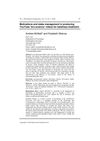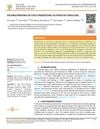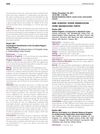 2 citations,
May 2001 in “Current problems in dermatology”
2 citations,
May 2001 in “Current problems in dermatology” The conclusion is that effectively treating hair disorders is difficult due to the complex factors affecting hair growth and more research is needed to improve treatments.
 2 citations,
January 1908 in “Journal of the American Medical Association”
2 citations,
January 1908 in “Journal of the American Medical Association” Fear of hair-related issues causes significant mental distress, especially in high-stress women.
 1 citations,
April 2020 in “Plastic and Aesthetic Nursing”
1 citations,
April 2020 in “Plastic and Aesthetic Nursing” PRP therapy might help increase hair growth for nonscarring alopecia, but more research is needed to confirm its effectiveness.
 1 citations,
February 2018 in “Madridge journal of dermatology & research”
1 citations,
February 2018 in “Madridge journal of dermatology & research” The plant extract remedy Satura® Rosta promotes hair growth and regrowth without negative effects.
 1 citations,
January 2018 in “International Journal of Web Based Communities”
1 citations,
January 2018 in “International Journal of Web Based Communities” Creators of YouTube 'bro-science' baldness videos are driven by a need to share and persuade, often emphasizing authenticity and community building, while navigating trust issues related to commercial ties.
 1 citations,
September 2017 in “Frontiers in Laboratory Medicine”
1 citations,
September 2017 in “Frontiers in Laboratory Medicine” Gut flora changes could potentially indicate depression, but more research is needed.
 1 citations,
November 2002 in “Neurosurgery Clinics of North America”
1 citations,
November 2002 in “Neurosurgery Clinics of North America” The article concludes that cranial reconstruction should aim for the best aesthetic result, using various techniques tailored to individual needs and conditions.
 1 citations,
January 2018
1 citations,
January 2018 Improve burn patients' appearance and function using various techniques, teamwork, and psychological support.
 1 citations,
November 2017
1 citations,
November 2017 The document concludes that while some organisms can regenerate body parts, mammals generally cannot, and cancer progression is complex, involving mutations rather than a strict stem cell hierarchy.
 1 citations,
May 2006 in “Expert Opinion on Therapeutic Patents”
1 citations,
May 2006 in “Expert Opinion on Therapeutic Patents” No FDA-approved treatments for chemotherapy-induced hair loss existed in 2006; more research was needed.

Ayurvedic herbs may reduce side effects and improve effectiveness of cancer treatments.

Onabotulinumtoxin-A effectively treated a painful scalp condition when other treatments failed.
 January 2024 in “Journal of dermatology and skin science”
January 2024 in “Journal of dermatology and skin science” Topical aprepitant reduces skin rash and hair loss caused by cancer treatment.
 December 2023 in “International Journal For Multidisciplinary Research”
December 2023 in “International Journal For Multidisciplinary Research” Indian medicinal plants can help with hair growth and common hair issues.
 December 2023 in “Research and reports in urology”
December 2023 in “Research and reports in urology” A young man with high-grade prostate cancer had successful surgery and good recovery, highlighting the need for awareness in younger men.
 November 2023 in “Linköping University medical dissertations”
November 2023 in “Linköping University medical dissertations” Keratinocytes and adipose-derived stem cells can effectively heal difficult skin wounds.
 August 2023 in “International journal of medical science and clinical research studies”
August 2023 in “International journal of medical science and clinical research studies” PRP therapy helps heal pediatric surgical wounds faster and with fewer scars but needs more research for safety and cost.
 January 2023 in “European endocrinology”
January 2023 in “European endocrinology” People with alopecia have a higher risk of thyroid cancer.

Social media data can help track and predict COVID-19 symptoms and trends.
 November 2022 in “CARDIOMETRY”
November 2022 in “CARDIOMETRY” A group has developed therapies that show promise for treating cancer and various other conditions.
 September 2022 in “Research Square (Research Square)”
September 2022 in “Research Square (Research Square)” Caffeic acid helps protect rats from the harmful effects of acrylamide.
 December 2021 in “International journal of research - granthaalayah”
December 2021 in “International journal of research - granthaalayah” A young woman had a rare, usually non-cancerous tumor on her face that was initially mistaken for a different condition.
 November 2021 in “Veterinary world/Veterinary World”
November 2021 in “Veterinary world/Veterinary World” YN oil combined with Rhinacanthus nasutus leaf is an effective and safe treatment for dog skin disease.
 October 2019 in “Skin appendage disorders”
October 2019 in “Skin appendage disorders” The vitreous membrane in hair follicles changes shape during the hair cycle and may affect hair growth and nutrient exchange.
 December 2018 in “Neuroradiology”
December 2018 in “Neuroradiology” MRI helps distinguish between pituitary adenomas and craniopharyngiomas, guides treatment for pediatric CNS tumors, and assesses rhinocerebral mucormycosis with a high mortality rate in transplanted patients.
 January 2018 in “Elsevier eBooks”
January 2018 in “Elsevier eBooks” The document concludes that alopecia has significant social and psychological effects, leading to a market for hair loss treatments.

Skin changes throughout life, from development before birth to aging effects like wrinkles, influenced by both genetics and environment.
 October 2013 in “Clinics in Plastic Surgery”
October 2013 in “Clinics in Plastic Surgery” Local anesthesia is effective, safe, and cost-saving for plastic surgery.

The data suggests that dosing differences can help manage spasticity in patients with upper motor neuron dysfunction.
 August 2003 in “International Journal of Cosmetic Surgery and Aesthetic Dermatology”
August 2003 in “International Journal of Cosmetic Surgery and Aesthetic Dermatology” Disposable instruments could be the future of hair restoration surgery to eliminate disease risk, but they require careful preparation and proper training.






























